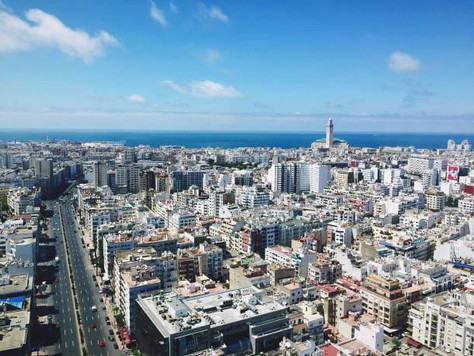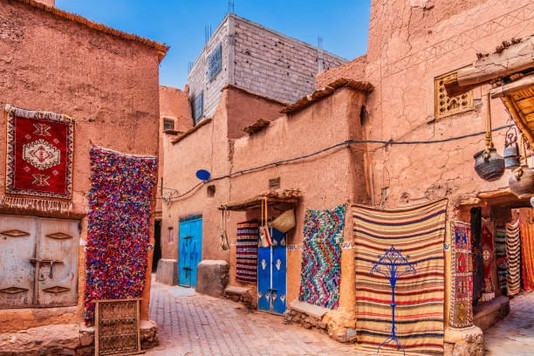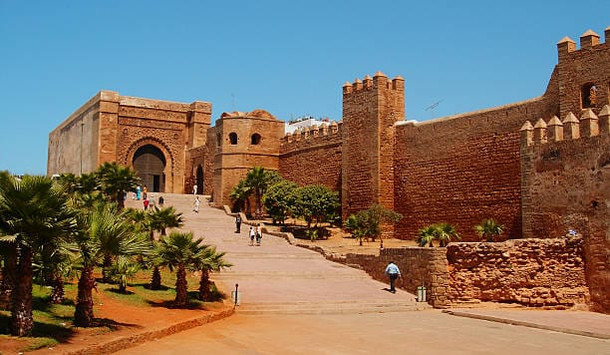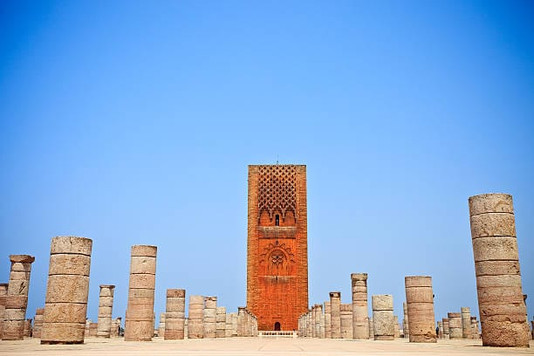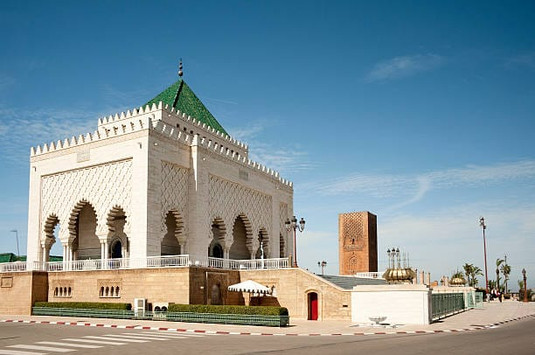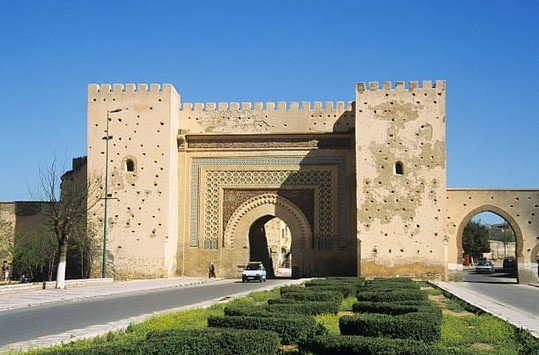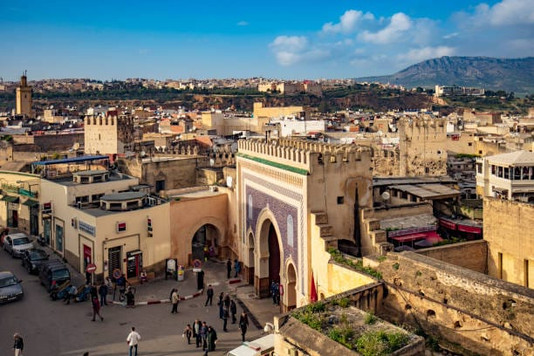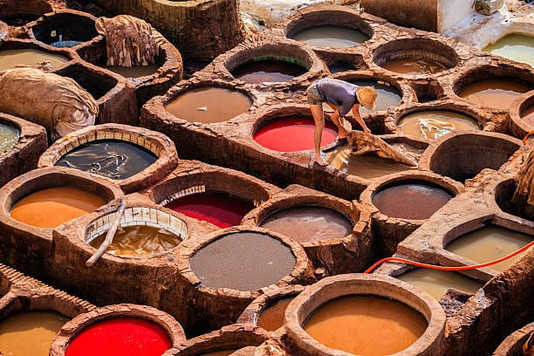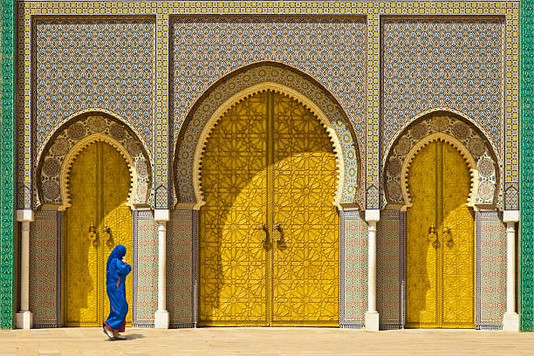MOROCCO 9 days, 8 nights
Imperial Cities & Atlantic Coast
Marrakech (2 nights) ↠ Essaouira ↠ Casablanca ↠ Chefchaouen ↠ Fez (2 nights) ↠ Casablanca
Forget the stress of everyday life, take a little break to spend a few days in fabulous landscapes !
The four Imperial Cities of Morocco (Marrakech, Rabat, Meknes, Fez), but also the pearl of the Atlantic coast Essaouira, the economic capital Casablanca, the sacred city of Chefchaouen, the Roman ruins of Volubilis,…
It is a complete program to discover Morocco, its very rich history, its famous and typical cities, its mosques and monuments, its local crafts,...
The landscapes of the cities, plains, seaside, mountains,... scroll before your eyes between site visits.
The hospitality of the Moroccans, the delicious cuisine,... complete to make this trip exceptional and unforgettable.
HIGHLIGHTS
This self driving tour is centered on the discovery of 7 Moroccan cities (including the Imperial Cities), all as beautiful as interesting : Marrakech, Essaouira, Casablanca, Rabat, Chefchaouen, Meknes and Fez.
But not only !
It intends to make you discover many other facets of this fabulous country :
* the variety and beauty of the landscapes : the light-flooded plains where ancestral agriculture is perpetuated, the rugged ocean coastline between Essaouira and Rabat, the pretty fishing ports of Safi and El Jadida, the towns and villages nestled in the mountains,...
* splendid and unexpected natural sites like the Roman ruins of Volubilis
* the ancestral traditions
* the welcoming, kind and helpful people
* the comfortable and superbly decorated riads, with patios and terraces where it is good to relax and spend a privileged moment
* the gastronomy full of flavors and delights : tagines, couscous, kebabs, pastries and of course the ritual of mint tea
* the typical and colorful craftmanship, in search of the souvenir object that you will bring back to decorate your interior
Route Map

d5
d6
d7
d8
C
d4
d3
d1
d2
D1 Arrival in Marrakech A
D2 Sightseeing day in Marrakech (35 km)
D3 Marrakech - Essaouira B (170 km)
D4 Essaouira - Casablanca C (370 km)
D5 Casablanca - Rabat - Chefchaouen D (340 km)
D6 Chefch. - Volubilis E - Meknes F - Fez G (265 km)
D7 Sightseeing day in Fez (20 km)
D8 Fez - Casablanca C (305 km)
GUIDE AND ASSISTANCE VEHICLE : Yes or No ?
* The guide is permanently at the disposition of the group.
* The guide speaks several languages, including necessarily English and the language of the country, this can be very helpful if you do not master it enough.
* The guide knows the route and opens the convoy with the assistance vehicle, stopping at the best points of view.
* The assistance vehicle carries the first aid kit, any excess baggage,...
* If necessary, the guide activates external services (insurance, mechanical repair, rescue,...).
* The guide takes care of check-in and check-out in hotels, restaurant orders, access to national parks, tourist sites entrance fees and any other means of transport (local taxis, boat, plane),...
* Last but not least... the guide tells you about the country, the regions crossed, or even the places visited (when there is no local professional guide).
PRIVATE LOCAL DRIVER : Yes or No ?
* If you do not choose the Executive Van option, the Private local driver is an option, that will allow you to rest during the journeys (sometimes long) by car, to appreciate the landscapes, to easily ask your way if you get lost, ... for a reasonable additional cost.
* The local private driver speaks Arabic, generally French, more rarely another language.
But ... If you like to drive and prefer to stay between yourselves, the local private driver is not necessary, especially since the guide and the assistance vehicle accompany you throughout the journey.
Accomodation
Enchanting places in the heart of the medina, with typical decoration, superb patios and terraces, comfortable suites, warm welcome, impeccable service, delicious breakfast,...
Welcome to the riads and luxury hotels of our journey to discover the Imperial Cities !
History & Culture
Imperial cities is the name given to the four cities in Morocco that were
capitals of the ancient reigning dynasties :
-
Fez, founded by the idríssida caliph Idris I in 789
-
Marrakech, founded by Emir Almorávida Ibne Taxufine in 1062
-
Rabat, founded by the Almohad Caliph Abde Almumine in 1150
-
Meknes, founded by the Alawite Sultan Mulei Ismail in 1672
The other four cities on our tour are also definitely worth a visit :
-
Essaouira
-
Casablanca
-
Chefchaouen
-
Volubilis (Roman ruins)
Fez


Fez has several ETYMOLOGIES, some originating from popular legends and others resulting from the work of historians.
According to the "classical" etymology, it dates back to the discovery in the 10th century, during excavations of the foundations of the city under construction, of a pickaxe or alvião (Fä's in Arabic), which gave rise to the name of Madinat Fäs. But according to a popular legend, Idris I, the founder of the city, participated in its construction and helped in the excavations of the foundations with a pick of gold and silver and that is why the city took its name.
Marrakech

ETYMOLOGY is debate!
"Land of God", from berber mur(n)akush? "Country of the sons of Kush" according to the manuscript of the library Quaraouiyine de Fez (11th century)? In Latin Berber alphabet, it is Mṛṛakc, and in Moroccan Arabic the pronunciation sounds something like "mer-reqx".
From the Middle Ages until the beginning of the 20th century, Morocco was known as "Kingdom of Marrakech" and Marrakech as "City of Morocco", due to the city having often been the historical capital of the country or its most important kingdoms. The name of Morocco in Persian (مراكش), Urdu and many South Asian languages is still the same today as the city, and in Portuguese, it derives directly from the Berber Murakush. Marrakech and Morocco “fell apart” first when the Fez Treaty made Morocco a French and Spanish protectorate, then definitely on the country's return to independence when it was officially called al-Mamlaka al-Maġribiyya (المملكة المغربية in Arabic, "Kingdom of Maghreb "or" Kingdom of the West ").
The city is known by various nicknames, such as "Red City", "Ocher City" or "Daughter of the Desert" and was used in poetic analogies, for instance comparing the city to "a drum that drums an African identity in the complex soul of Morocco ".
Rabat

ETYMOLOGY is clear for the capital and 2nd largest city in Morocco : ar-Ribaāṭ means literally "fortified place", since the founder, the Almohad caliph Abde Almumine, built a fortress in 1146 (with also a mosque and a residence).
HISTORY tells that Rabat existed before as Chellah, and then Sala de Colonia when the Romans took over in AD 40. Only in 1146 did Abde Almumine build the great fortress to use as a point of attack against Spain. In 1170, the city was renamed Ribatu l-Fath ("fortress of victory"). Iacube Almançor, another Almohad caliph, transferred the capital of his empire to Rabat. He built walls from Rabat to Kasbah Udayas. When Iacube died, the construction stopped (the ruins of a large unfinished mosque, and its imposing minaret, the Hassan Tower, are still there today), the Almohad Caliphate lost control of its possessions and much of Rabat's economic power fell apart. Only in the 16th century, the Nasrids colonized the region, and re-boosted Rabat's growth.
Meknes

ETYMOLOGY refers to the name of the Berber tribe Micnasa, whose members are called Imknassen in the plural and Ameknas (warrior or combatant) in the singular. Even today, Berber activists call the city Ameknas.
HISTORY of Meknes dates back to the 9th century when the Berber tribe of Meknassa established their camp north of Wadi Boufekrane, giving the city its name. The Almoravids made Meknès a military place in the 11th century. The Almohad Caliphate destroyed the city because it resisted them, rebuilding it bigger and more beautiful, with mosques (Grand Mosque), between 1199 and 1213, and powerful fortifications. In the 14th century, the city is taken over by the Merinids, who build madrasas (Bu Anania), kasbahs (fortresses) and mosques. During the Oatacid period, the city was prosperous.
Essaouira

Located on the southwestern Atlantic coast of Morocco, Essaouira (الصويرة in Arabic, Amegdul in Berber), formerly Mogador, is one of the most pleasant beach resorts in Morocco, for its extensive sands, dunes but also for its historic center, a Unesco World Heritage Site since 2009. It is a 18th century city with a medieval town, surrounded by walls, open to the winds that gave it the nickname "Wind City, Afrika" among windsurf lovers.
HISTORICALLY, the Portuguese under the command of Diogo de Azambuja built a fort in 1506, Castelo Real de Mogador, but abandoned it to the Berbers in 1510. In 1525 this castle was occupied by the Moroccans. The small port developed in the 18th century when the Sultan of Morocco chose the location to be the country's exporting port, henceforth called Essaouira.
HERITAGE consists of walls and ramparts, in addition to the old Portuguese artillery pieces, the primitive church and the fortifications on the small island of Mogador, bordering the port.
Casablanca

The ETHYMOLOGY of the name Casablanca (الدار البيضاء, Dar el Beida, White House in Arabic) dates back to the village, called "Casa Branca", which grew around the fortress built by the Portuguese in 1515 on top of the ruins of Port Anfa (or Anafé) destroyed by themselves in 1468.
According to HISTORY, the area was first colonized by the Berbers in the 10th century BC, later used as a port by the Phoenicians and the Romans, and then as the seat of the small independent kingdom of Anfa that resisted until the conquest by the Almoravids in 1068.
Chefchaouen

ETHYMOLOGY (Accawen, Berber name of the city) means "the horns" in Rifarian Berber, in reference to the peaks of the Kelaa and Megu hills on the slopes of which it is located. The city was officially called Xauen in Spanish during the Spanish protectorate. The Portuguese used to call the city Barraxe or Barraxá in reference to the first mayor Mulei Ali ibne Raxide.
HISTORICALLY, Chefchaouen was founded in 1471 by Jbel La'lam's most famous sheriffs. Mulei Ali Ibn Rachid (Barraxe in Portuguese), the first mayor, descendant of Saint Moulay Abdeslam Ben Mchich Alami and Muhammad, built a small fortress (which still exists today). From this stronghold in the mountains, he and his successor son (after his death in 1512) Mulei Abrahem fought against the Portuguese in Morocco, sometimes allied with the Tetouan, Larache Jazém and Alcácer mayors, to regain Tangier and, mainly, Arzila. For a time, Chefchaouen was a semi-independent emirate capital that controlled much of northwestern Morocco in alliance with the Oatacids of Fez. But it lost its strategic position against the Portuguese to Tetouan, better positioned for attacks against Tangier and Ceuta, still in the hands of the Portuguese.
Volubilis (Roman ruins)

ETHYMOLOGY (وليلي, Walili or Walila in Arabic) is controversial. In Latin, volubilis means "in rotating movement". It may also be a Latinization of the Berber Walili or Walila, which designates the alendron plant or its flowers, which are particularly abundant on the banks of the wadi.
HISTORICALLY, Volubilis was a Roman city, whose partially excavated ruins have become a Unesco World Heritage Site since 1997. The area has been inhabited since at least the Late Atlantic Neolithic, around 3000 BC (according to Neolithic ceramics with designs similar to pieces found in the Iberian Peninsula). The ancient city would have been born during the Kingdom of Mauritania, in the IV or III century BC, and it developed from the III century BC as a Phoenician-Carthaginian settlement.
Local Gastronomy
While discovering exceptional cities and landscapes, we can also feast on delicious local gastronomy !
Prices 2024
If you are interested in this trip, contact us directly, we will be happy to answer all your questions !
PRICE PER PERSON (With accommodation in double/twin suite)
1 person in the rental vehicle (Single suite included)
2 persons in the rental vehicle
3 persons in the rental vehicle
4 persons in the rental vehicle
Supplement for Single suite
PRICE FOR THE GROUP (Optional)
Guide-coordinator in the rental vehicle
Guide-coordinator in Assistance Vehicle
$ 8.420
$ 4.570
$ 3.490
$ 2.950
$ 561
$ 4.125
$ 5.880
* Fixed prices established in $ (USD)
** Payment by bank transfer directly to our account (amount converted into your local currency at the daily exchange rate)
The invoice for your purchase will be sent to you by e-mail after your payment.
Included
-
All activities inside the program
-
Accomodation with breakfast
-
Rented car (with/without driver) or Executive van with driver
-
Radio/GPS (if private car)
-
Local guides and Entrance fees in the 8 cities
-
Travel File, organization, coordination
-
Permanent guide & Assistance Vehicle
Not Included
-
Flight ticket to RAK/from CMN
-
Drinks, lunches and dinners
-
Rented car fuel, parking fees and tolls (if private car)
-
Entrance fees of optionnal visits
-
Local taxis & Personal expenses
-
Private Travel insurance
CANCELLATION POLICY
Rescheduling or Cancellation by Customer
Rescheduling (according to availability) :
- Free of charge up to 45 days before the start of your package
- With 25% increase less than 45 days before the start of your package
Cancellation :
- Refund of 50% up to 45 days before the start of your package
- No refund less than 45 days before the start of your package
Rescheduling or Cancellation by Dream Sports Adventure
Dream Sports Adventure reserves the right to cancel the package in case of insufficient registration, force majeure or any other valid reason, and in such circumstances will propose to reschedule according to availabilities or to fully refund the packages already purchased, without however giving entitlement to compensation.










